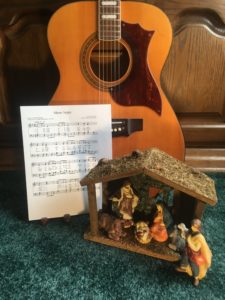 The story of its creation and promotion has several variations and differing nuances. The length of its rise to fame spans decades; its influence has continued for two hundred years. Not only is it known throughout Christendom, but also it is likely recognized and employed during the holidays by even those who have not come to faith in Christ. What, might you ask, would have such an enormous impact on humanity save for the Word of God itself? It is the beloved carol sung and played throughout the Christmas season, Silent Night.
The story of its creation and promotion has several variations and differing nuances. The length of its rise to fame spans decades; its influence has continued for two hundred years. Not only is it known throughout Christendom, but also it is likely recognized and employed during the holidays by even those who have not come to faith in Christ. What, might you ask, would have such an enormous impact on humanity save for the Word of God itself? It is the beloved carol sung and played throughout the Christmas season, Silent Night.
This year is the 200th Anniversary of the musical composition and inaugural performance of the song known for its beautifully simple lyrics and melody. An authentic score was found in 1995 pinpointing the date of Mohr’s original writing as being in 1816. Tales abound as to the reason this carol was written, as well as about the circumstances of its employ.  A faulty organ at St. Nicholas church in Oberndorf, Austria is often given as the reason for Mohr’s request that the song be accompanied by guitar. Some credit ravenous mice for the problem, believing they damaged the organ’s bellows. No matter. When Father Joseph Mohr passed on the lyrics to organist, Franz Gruber, his request was for the stringed instrument, two voices, and a choir to bring the first sounds of this tender carol to the listeners’ ears. And so it was that Franz Gruber created an accompaniment and fashioned a melody that along with Joseph Mohr’s poem has touched the hearts and lives of people ever since.
A faulty organ at St. Nicholas church in Oberndorf, Austria is often given as the reason for Mohr’s request that the song be accompanied by guitar. Some credit ravenous mice for the problem, believing they damaged the organ’s bellows. No matter. When Father Joseph Mohr passed on the lyrics to organist, Franz Gruber, his request was for the stringed instrument, two voices, and a choir to bring the first sounds of this tender carol to the listeners’ ears. And so it was that Franz Gruber created an accompaniment and fashioned a melody that along with Joseph Mohr’s poem has touched the hearts and lives of people ever since.
As I think back to the night about which Silent Night is written, the birth of our precious Lord and Savior in a lowly stable, I wonder just how silent a night like that could be. Wouldn’t there have been a lot of hustle and bustle around a young mother about to give birth in such an unlikely place? Could the animal occupants, perhaps shooed and unsettled from their regular stalls, hold back their moos, baas, bleats, and other utterances that would normally be heard among them? And what about Mary herself, a young lady having her first child? Would she have delivered without a sound or a cry as she brought forth that baby boy? Though the Word itself is silent on the probable ambient noise surrounding the birth of the infant King, it is not hard to imagine that the awe and wonder of his arrival was met with a holy silence all around as his presence dawned on our fallen world. The Savior, the promise and hope that all mankind so desperately needed, captivated his mother, his earthly father, the animals surrounding him, and the shepherds who came to worship him, and the earth held its collective breath. The same awe and wonder must have captivated Father Mohr as he penned his apt lyrics.
And what about us? How silent is our reception for the Savior of the world? Our lives are most likely filled with parties, plays and concerts, shopping days, baking and cooking, visiting and being visited. We barely have room to breathe let alone make room for an uninterrupted audience with him. The title of the song in its original German language is Stille Nacht. In English, “Stille” can be translated silent, but also quiet, peaceful, calm, and of course, still. How often do we take the time to just be still before the Lord? His Word does encourage us to “Be still and know that I am God” (Psalm 46:10, ESV). It is only in the still moments that we can truly reflect on who he is and what his coming means to us and to the world. It is only in the realm of silence that we become aware of the awe and wonder experienced by those who were first in his presence, and we can then become captivated with the One and Only Son of God sent into our world to save us. Can you take some time to be still to focus on his coming this Christmas season?
“For unto you is born this day in the city of David a Savior, who is Christ the Lord. And this will be a sign for you: you will find a baby wrapped in swaddling cloths and lying in a manger” (Luke 2:11-12, ESV).Silent night, holy night.
All is calm, all is bright
‘Round yon virgin mother and Child;
Holy infant so tender and mild,
Sleep in heavenly peace,
Sleep in heavenly peace. – Father Joseph Mohr
References:
Stille Translation
World’s Best Loved Carol
The Story Behind Silent Night
History of the Song
Celebrating Holidays
 0 items
0 items





